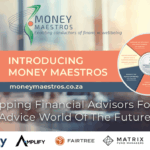| ASISA IFA PRACTICE MANAGEMENT PROGRAMME You have recently completed the ASISA IFA Practice Management Programme. How did you benefit from the programme? I have grown immensely as a professional, both in knowledge and confidence. My business has grown, evidenced by our ability to offer professional services at a higher standard. Our streams of business have developed. Our ongoing revenue is following our growing AUM. What advice would you give to other financial planners who were considering doing this programme? I would advise them to keep an open mind and be willing to “change” themselves, then they can change their businesses or practices. If they can change their practices, then they can change people’s lives and experience of receiving financial service. |
Please provide a brief career history to this point.
My debut in financial services started some time back in 2001 when I joined Old Mutual PFA as a financial advisor, whereafter I joined Liberty Life as a broker consultant and the world of insurance opened to me. I started understanding various products in the industry. I moved to join First National Bank (FNB) as an area sales manager responsible for bancassurance in the Capricorn and northern regions of Limpopo. It was then that I thought of the idea of being independent from the products in order to provide independent and objective advice. I resigned from FNB and applied for an independent licence with the Financial Sector Conduct Authority (FSCA) to become an independent advisor in 2007 for Matiyimela Investments [then Khalanga Financial Services].
What inspired you to become a financial planner?
I saw people taking out a lot of policies because they were sold but without any financial advice given to them. I concluded that there has to be someone advising people on money and money management.
What prompts clients to come to you?
Clients come to us because they believe that we can offer them a financial plan and money advice that will help them to rearrange their finances and grow. Our distinctive value offering lies in that we offer our clients a holistic financial plan, ranging from investment, retirement, estate to risk planning. It is distinctive in that our clients can have the entire money and wealth portfolio with us instead of doing estate planning in one place and their asset protection such as short-term insurance elsewhere. We stand out as a family financial planner, and thereafter, grow with the children as they start working and inheriting from their parents.
How do you decide whether a potential client is someone you want to work with?
We look at the client’s objectives to see if we can assist in meeting these goals, and the level of interest that the client shows in meeting them as well as their availability to me and my office staff.
What is the most important thing you do for clients?
We help our clients by putting their financial ideas into reality concisely. They wish to put their children through school, we help them to achieve such. We protect their income so that they can still earn in cases of illness. We are a financial sounding board for our clients.
What are the biggest mistakes that you see clients make?
Failure to stick to a budget. Consuming social media money advice and forgetting their goals and background. Another big mistake clients make is not seeing how they can use us to achieve most of their needs financially.
How do you charge for your services?
We have three methods of charging our fees:
- Fees based on the assets being invested.
- Fixed fees based on transaction or plan being implemented.
- Fees based on advice given without implementation.
Would you advise a potential client not to use a robo-advisor?
I don’t persuade clients not to use robo-advisors, I am happy that they use them. My role is to show them the difference between my services and that of a robot. We have a better client outcome than that of a robot.
What role does technology play in your practice?
It plays a vital role. It makes giving advice easy, and it can be illustrative to a client. We use technology to manage our business and our services.
What do you enjoy most about being a financial planner?
You are at the forefront of wealth creation and protection, which can make a huge difference to future generations.
What do you enjoy least about being a financial planner?
When I fail to convince a client to do the right thing and imagine the potential outcome of failing to make provisions.
What would your colleagues say is your best attribute?
That of a helping hand and being a stepladder. Willingness to help and see you do and become better.
What would your colleagues say is your worst attribute?
Trusting too much and believing that anyone can do it as long he or she is trained or shown how to.
What would your clients like most about working with you?
I’m available to help in any way. I am trustworthy. And we don’t force anything onto clients.
What would your clients say is an area for improvement?
Time spent on meetings should be shortened to achieve the same outcomes.
What are your biggest challenges as a financial planner?
Clients or potential clients confuse us with agents of insurers or insurers themselves. Clients not comprehending our role in their financial lives.
What is the biggest change you have seen in financial planning during your career?
How we run business today as an FSP compared to how we ran business 17 years ago when I became an independent advisor. I see the protection of information laws and the money laundering laws and the number of institutions one must register with and report to. The landscape has changed dramatically.
What advice would you give a young graduate considering entering the profession?
I would advise them to start their practices as a business, and not as a job, and be ready for continuous professional development to stay ahead and be impactful. To build annuity income for the business from the word go will prove valuable in the medium to long run. A financial planning business without an ongoing income is a sales agency for any insurer with a policy to “quick issue” for a quick buck.
What’s your one wish for the future of the profession?
I wish that there could be “real” entry-level requirements for financial planning professionals. Currently in our profession I see a lot of “doctors conducting surgery without medical qualifications”. What I mean is financial planners/advisors who cannot tell the difference between inflation and interest rate, or present value versus future value, yet they are so-called financial advisors or financial planners.
| PERSONAL PERSPECTIVES What do you do to relax outside of work? I take my bike out on the road and feel the air. What’s your favourite food? I love seafood, particularly prawns What’s your favourite type of holiday? Bush lodges and nature routes. Anywhere there is the natural hand of God and less human intervention. If you weren’t a financial planner, you would be…? A game ranger. What’s the biggest financial mistake you have made? Not learning quicker how to manage and multiply it. What do you think your family/friends like most about you? I am honest, caring and reliable. What do your family/friends like least about you? I don’t beat around the bush, I am straightforward. Equivocating is not my strength. If you could have dinner with anyone alive or dead, who would that be and why? It would be Pope Francis to talk about God, and how we came to where we are as people here on earth in relation to God. |










